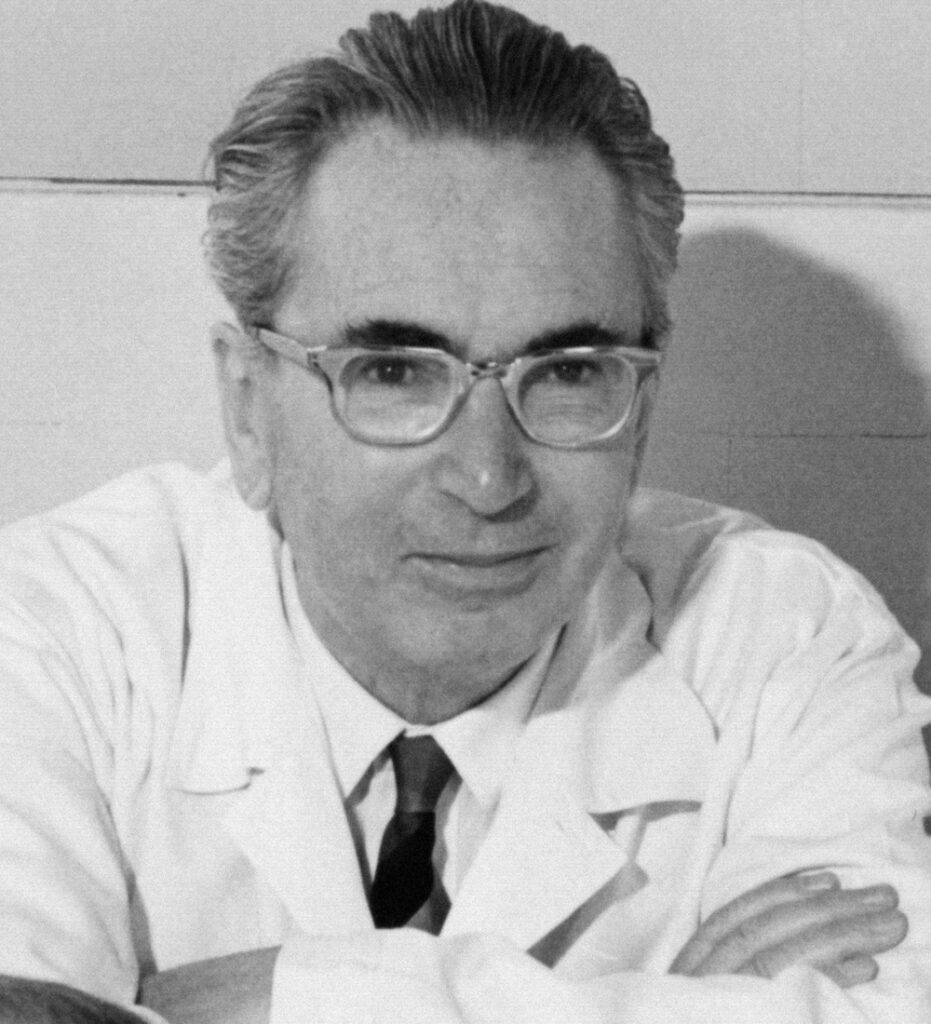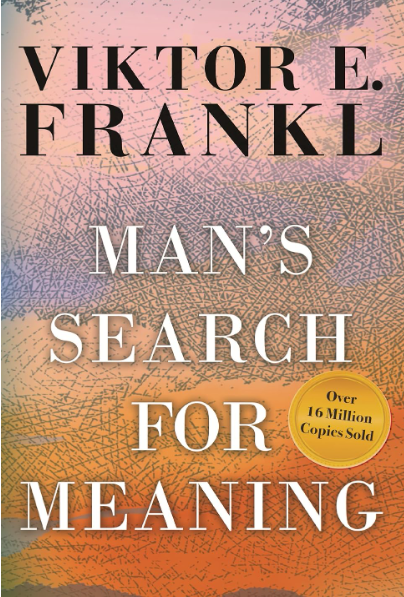If there’s one book I believe everyone should read for personal growth, it’s Viktor Frankl’s Man’s Search for Meaning. With over 12 million copies sold globally and a place on countless school and therapy reading lists, this isn’t just a bestseller—it’s a soul-stirrer. Frankl’s words have a way of embedding themselves in your memory long after you close the final page.
The story behind the book isn’t just moving—it’s a raw, emotional gut-punch. It forces you to confront what human beings are capable of, not only in the face of unspeakable horror but also in their quiet refusal to surrender meaning, dignity, or purpose.

Frankl didn’t write from an ivory tower of theory. He wrote from a concentration camp—literally. As both a Holocaust survivor and a respected psychiatrist, Frankl experienced the worst of humanity firsthand, yet he came out of that experience with a message of hope. A message rooted not in blind optimism, but in deeply lived truth.

If you’ve ever felt burned out, lost, or stuck asking yourself, “What’s the point of all this?” then Frankl’s book offers an answer that cuts through the noise. It doesn’t sugarcoat suffering—it reframes it. It reminds us that purpose isn’t something we wait for. It’s something we choose, even in chaos.
“What if the key to surviving suffering is finding a reason to keep going?”
That question is at the heart of Frankl’s philosophy—and it’s why Man’s Search for Meaning continues to resonate with millions across generations.
Getting to Know Viktor Frankl

Frankl’s life reads like the script of a harrowing biopic—but it was all real.
Born in 1905 in Vienna, Viktor Frankl was already a neurologist and psychiatrist before World War II shattered the world around him. He was part of a lineage of psychological thinkers that included Sigmund Freud and Alfred Adler, yet his philosophy took a bold turn of its own.
Frankl developed what he would later call Logotherapy, a form of existential analysis grounded in one central idea:
Human beings are primarily driven by a search for meaning—not pleasure (as Freud said) or power (as Adler claimed).
But everything changed in 1942 when Frankl, along with his wife and parents, was deported to a series of Nazi concentration camps. Over the course of three brutal years, including time spent in Auschwitz and Dachau, he lost nearly everyone he loved.
And yet—this is where the story shifts.
Instead of collapsing under the weight of grief and terror, Frankl observed what separated those who survived from those who gave up. It wasn’t strength or luck. It was meaning.
He quotes Nietzsche to summarize what became the cornerstone of his entire philosophy:
“Those who have a why to live can bear almost any how.”
That one sentence encapsulates the beating heart of Frankl’s message: meaning matters more than circumstance.
What “Man’s Search for Meaning” Is All About

At its core, Man’s Search for Meaning is both a memoir and a psychological guide. The brilliance of the book lies in its dual structure:
➤ Part 1: Frankl’s Holocaust Experience
Frankl recounts his time in the camps—not for shock value, but to examine how different people responded to the same horrors. He noticed patterns in mindset, survival, and the deep role meaning played in who endured.
Rather than focus on graphic suffering, Frankl spotlights the human response to suffering—dignity, despair, hope, love, and everything in between.
➤ Part 2: The Birth of Logotherapy
In the second half, Frankl explains the psychological framework he developed from those experiences. This is where he introduces Logotherapy—a system built to help people find meaning through love, work, or even suffering itself.
This structure gives the book its powerful punch. It’s not just a tragic story or abstract theory—it’s a lived blueprint for how to endure, grow, and find purpose in your own life, no matter the circumstances.
Major Themes in Man’s Search for Meaning
Viktor Frankl’s Man’s Search for Meaning doesn’t just share a compelling story — it lays out a radically empowering view of the human experience. Below are the key themes that define the book and why they still resonate today.
1. The Core Human Drive: Searching for Meaning
Frankl challenges the giants of psychology. Where Freud said people seek pleasure and Adler pointed to power, Frankl offers a deeper insight:
“The primary human drive is not pleasure or power — it’s meaning.”
He saw this theory tested in the most brutal lab imaginable: the concentration camps. When everything else was stripped away, those who clung to a sense of purpose — whether it was seeing a loved one again, completing an unfinished manuscript, or simply holding onto their dignity — were more likely to survive.
Meaning, Frankl observed, was more durable than comfort. And when life becomes unbearable, it’s often the only thing that keeps us going.
2. Suffering Doesn’t Have to Be Pointless
One of the book’s most radical ideas is that suffering, while unavoidable, doesn’t have to be meaningless.
Frankl never glorifies suffering — but he does believe we can transform it. In the camps, he saw people who gave up quickly and others who found purpose even in pain: supporting one another, preserving a shred of decency, imagining a better future.
“Suffering ceases to be suffering at the moment it finds a meaning.”
This theme echoes throughout modern psychology and even Stoic philosophy: if you can make sense of your pain, it stops being just pain — it becomes growth.
3. Attitude Is the Last Human Freedom
One of Frankl’s most famous lines is this:
“Everything can be taken from a man but one thing: the last of the human freedoms — to choose one’s attitude in any given set of circumstances.”
This isn’t just a feel-good quote. It’s a reality check. Even in total darkness, we get to decide how we’ll respond internally.
You may not be able to change your situation, but you can change how you frame it. Frankl argues that this freedom of attitude is what makes us truly human.
4. Choosing Responsibility Over Victimhood
After surviving the unimaginable, Frankl became a vocal critic of nihilism — the belief that life has no meaning.
His experience led him to the opposite conclusion: even in horror, meaning is always possible. But it requires us to take ownership of our choices and reactions.
Meaning isn’t handed to you — it’s created by how you respond to life.
Frankl believed that falling into victimhood robs us of our power. Taking responsibility — for our mindset, our choices, our outlook — is what opens the door to meaning.
5. Love as the Ultimate Purpose
 Frankl’s spirituality shines through in his belief that love is the highest form of meaning.
Frankl’s spirituality shines through in his belief that love is the highest form of meaning.
In the camps, many held on to life by visualizing someone they loved — a spouse, a child, even a memory. That image gave them strength when their bodies were ready to give out.
“Love is the only way to grasp another human being in the innermost core of his personality.”
For Frankl, love wasn’t just emotion — it was transcendence. A spiritual anchor. A reason to live.
6. Hope for the Future Is a Lifeline
Frankl repeatedly emphasized that having a future goal — something to look forward to — was crucial to surviving trauma.
He noticed that people who lost hope quickly declined. The moment you stop believing in “what comes next,” your inner world collapses.
The future isn’t just a timeline — it’s a tool for psychological survival.
Even something small — finishing a project, reuniting with someone, helping others — can keep a person going in unimaginable circumstances.
What Is Logotherapy? A Meaning-Centered Therapy
Logotherapy is the name Frankl gave to his approach — and it literally means “healing through meaning.” It’s a practical form of existential therapy that focuses less on introspection and more on real-world action, responsibility, and attitude.
Rather than helping people analyze their past, Logotherapy asks:
- What do you live for?
- What gives your life meaning right now?
- How can you take responsibility for your suffering?
The Three Main Ways to Find Meaning:
- By Doing – Through meaningful work or creative pursuits
- By Loving – Through deep human connection, empathy, and care
- By Suffering – When unavoidable, suffering can be transformed through mindset and purpose
Frankl also coined the term “existential vacuum” — the inner emptiness many people feel in modern life. He believed this emptiness wasn’t caused by pain, but by a lack of purpose.
It’s not that life is too hard — it’s that life feels empty.
In a world chasing dopamine, Logotherapy offers a radically different antidote: depth, direction, and accountability.
Powerful Quotes from Viktor Frankl (And What They Mean)
Frankl’s book is packed with lines that stay with you. Here are some of the most powerful, along with how they hit in real life:
“When we are no longer able to change a situation, we are challenged to change ourselves.”
That’s resilience, in one sentence. You may not fix the world, but you can shift your perspective.
“The meaning of life is to be discovered in the world rather than within man or his own psyche.”
Purpose is found outside of you — in action, relationships, and responsibility — not just in navel-gazing.
“Suffering ceases to be suffering at the moment it finds a meaning.”
Pain with purpose isn’t the same as pain without it.
“Love is the only way to grasp another human being in the innermost core of his personality.”
Love isn’t fluff — it’s clarity. It’s the deepest way we connect.
“Live as if you were living for the second time and had acted as wrongly the first time as you are about to act now.”
This one hits hard. It forces you to examine your life as if you were already looking back. Are you proud of what you’re doing now?
Frankl’s Influence in Today’s World
You’ll see Viktor Frankl’s fingerprints all over modern personal growth teachings:
- Stephen Covey’s 7 Habits puts meaning and proactivity at the center.
- Eckhart Tolle channels a similar inner freedom from circumstances in The Power of Now.
- Stoic philosophy from Marcus Aurelius echoes Frankl’s stance on attitude, purpose, and resilience.
These aren’t surface-level overlaps — they’re part of a growing movement toward conscious, purpose-driven living.
How to Apply Frankl’s Wisdom in Daily Life

In a world overloaded with distractions, stress, and digital pressure, Man’s Search for Meaning feels more relevant than ever.
Here’s how you can bring Frankl’s ideas into your everyday mindset:
1. Coping with Grief and Trauma
Grief doesn’t have to be the end of your story. Frankl’s approach invites you to ask:
“What lesson or direction could this pain be pointing me toward?”
That reframing has helped trauma survivors, therapists, and spiritual seekers alike find clarity in the chaos.
2. Finding Meaning in Work
Even the most ordinary job can have extraordinary purpose. Frankl asks us to shift the question from:
“Is this fulfilling me?”
To: “How does this serve others? What deeper value am I contributing?”
This mindset has influenced leadership, workplace culture, and coaching programs worldwide.
3. Bouncing Back from Failure
Failure is not the end — it’s feedback. Frankl encourages us to look at failure as another doorway to meaning.
Missed the mark? Start again — but this time, with purpose.
4. Growing Through Adversity
Don’t run from the hard stuff — engage with it. Ask yourself:
What if this challenge was made just for me? What strength is it trying to grow in me?
That kind of thinking can turn breakdowns into breakthroughs.
Frankl’s influence now lives on through the positive psychology movement, post-traumatic growth studies, and countless therapists, coaches, and thinkers who believe that adversity, reframed with purpose, can lead to the most profound transformation of all.
Common Misunderstandings About Viktor Frankl’s Message
As with many influential thinkers, Viktor Frankl’s ideas are sometimes oversimplified or misinterpreted. Here’s what Man’s Search for Meaning is not saying — and why it matters.
Misconception #1: Frankl Promoted “Toxic Positivity”
Some people misread Frankl’s story and conclude that he’s urging us to always find meaning in suffering — as if we’re supposed to slap a smile on every tragedy. That’s not the message at all.
Frankl never said suffering is good. He said it can become meaningful — if we choose.
He made it clear: pain, grief, and anger are natural human responses. His work allows space for honest emotion. But when suffering can’t be avoided, choosing to give it meaning becomes a way to regain agency. Not denial — empowerment.
Misconception #2: Meaning = Material Success
Frankl also warns against false purpose — chasing things like wealth, fame, or validation to fill the void.
Meaning isn’t about achievements. It’s about alignment.
He encourages us to look inward and ask:
- What actually matters to me?
- Is this goal something I truly care about — or just what the world expects of me?
Meaning is deeply personal. It’s not something you can borrow or fake your way into. And it certainly can’t be bought.
Misconception #3: You Have to Suffer to Find Meaning
This one’s especially common — and totally off-base.
Frankl never said suffering is a requirement for growth. He said that when it comes (and life guarantees it will), we’re still free to choose our response.
If your life is already full of love, creativity, and connection — you don’t need pain to make it meaningful.
Frankl devoted much of his later work to showing that joy, beauty, service, and creativity are just as powerful as sources of meaning as adversity is.
Frequently Asked Questions
What is the main message of Man’s Search for Meaning?
The core message of Viktor Frankl’s Man’s Search for Meaning is that life has meaning under all circumstances, even in suffering. Frankl argues that finding purpose is essential to human survival and well-being, and that we can endure almost anything if we understand why we’re enduring it.
What is logotherapy in simple terms?
Logotherapy is a form of existential therapy developed by Viktor Frankl. It focuses on helping individuals find meaning in their lives as a way to overcome challenges. Unlike traditional psychoanalysis, logotherapy is future-oriented and meaning-driven, asking: “What is life asking of you?”
How is Man’s Search for Meaning still relevant today?
The book remains highly relevant because its themes—resilience, purpose, and human dignity—are universal and timeless. Especially during times of uncertainty, Frankl’s emphasis on inner freedom and personal responsibility resonates with modern readers facing mental health challenges, job loss, or existential anxiety.
Who should read Man’s Search for Meaning?
Anyone navigating a difficult period, questioning their purpose, or interested in personal growth will benefit from reading this book. It’s especially helpful for readers drawn to psychology, philosophy, or spiritual resilience.
How can I apply Frankl’s teachings in my daily life?
You can start by identifying small sources of meaning—relationships, creative work, acts of kindness—and using them as anchors during hard times. Asking questions like “What is this moment trying to teach me?” or “What’s one meaningful thing I can do today?” puts Frankl’s wisdom into practice.
Books & Thinkers That Echo Frankl’s Wisdom
Want to go deeper into purpose, presence, and mindset? These books pair well with Man’s Search for Meaning and expand on related ideas:
The Power of Now by Eckhart Tolle
If you’re drawn to Frankl’s message of inner freedom, The Power of Now is a natural next step. Eckhart Tolle shows how presence—not external change—is what frees us from mental suffering. It’s one of the most impactful spiritual guides of our time.
🔹 The 7 Habits of Highly Effective People by Stephen Covey
Stephen Covey builds on ideas that echo Frankl’s core message: proactivity, responsibility, and values-driven living. If you’re looking for a more structured way to turn meaning into action, this is the book to get.
🔹 The Hero’s Adventure by Joseph Campbell
Campbell’s work on myth and transformation connects to Frankl’s idea of suffering as a path to rebirth.
🔹 On the Shortness of Life by Seneca
This Stoic classic emphasizes living with intention and presence — a perfect companion to Frankl’s themes.
How to Start Finding Meaning in Your Own Life
Frankl didn’t write this book just to tell a story. He wrote it to challenge you.
“Live as if you were living for the second time and had acted as wrongly the first time as you are about to act now.”
— Viktor Frankl
That line isn’t just a quote — it’s a wake-up call. So how do you actually put this into practice?
Try These Reflective Prompts:
- What gives my life real meaning?
List the people, projects, or beliefs that truly inspire and ground you. - How can I reframe a current struggle?
Look at one difficult experience and ask: What might this be teaching me? - Who or what do I live for?
Who do you show up for, even when things feel heavy? Let that awareness guide you.
Tip: Keep a journal for these reflections. Revisit them whenever you feel lost or overwhelmed.
Final Thoughts: Why Man’s Search for Meaning Still Matters
In a world drowning in distraction, pressure, and emotional burnout, Frankl’s voice cuts through like a clear bell. He reminds us that no matter what’s happening outside, we always have a choice inside. We can choose to seek meaning. To respond rather than react. To live, not just survive.
His message isn’t fluffy. It’s earned — through grief, suffering, and ultimately, transformation.
If you haven’t read Man’s Search for Meaning yet, now is the time.
It’s not just a book — it’s a companion for life’s hardest questions.
Whether you’re going through a rough patch, navigating change, or just feeling like something’s missing… Frankl’s words might just give you the spark you need to move forward — with courage, clarity, and purpose.
Explore More on Purpose, Presence & Growth:
- ➤ The Power of Now: Summary & Reflections
- ➤ How to Stop Overthinking – Tolle’s Wisdom in Action
- ➤ Atomic Habits: 13 Reflective Questions for Daily Growth
- ➤ The 7 Habits of Highly Effective People: Practical Guide

Chris is the voice behind Daily Self Wisdom—a site dedicated to practical spirituality and inner clarity. Drawing from teachings like Eckhart Tolle, Ramana Maharshi, and timeless mindfulness traditions, he shares tools to help others live more consciously, one moment at a time.
Learn more about Chris →

Leave a Reply